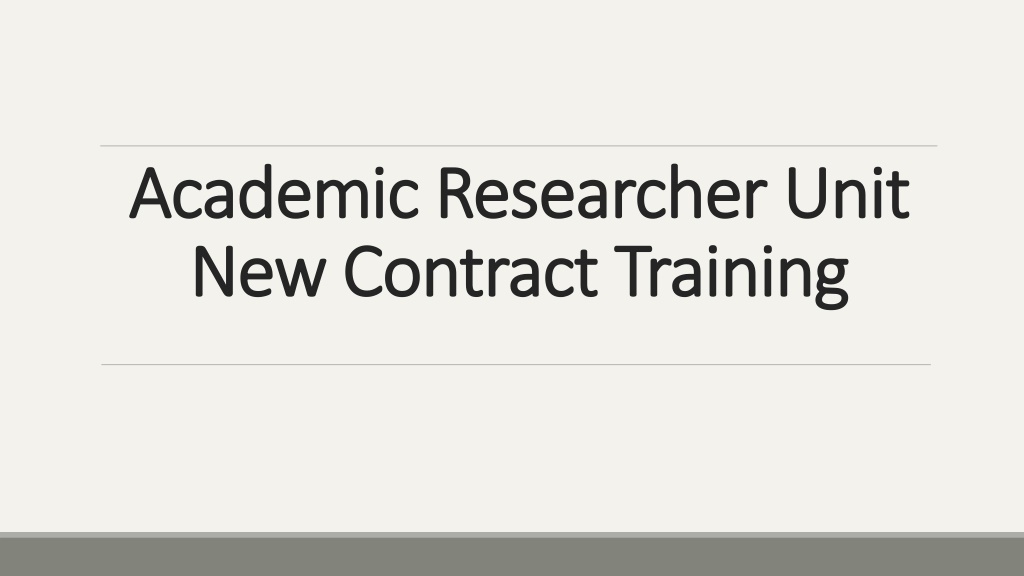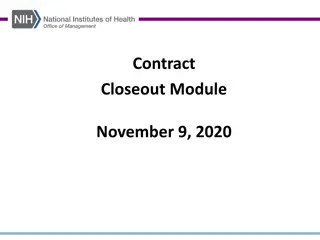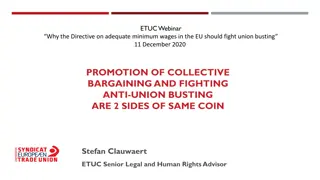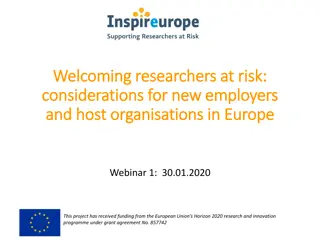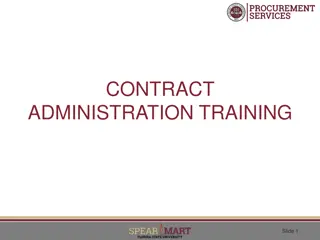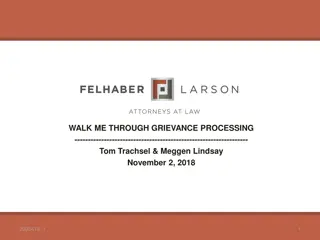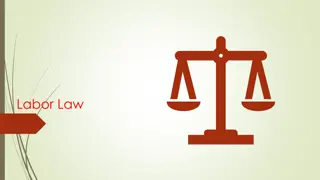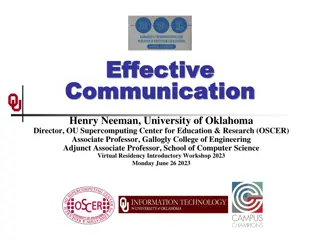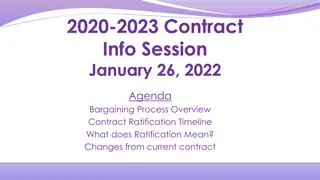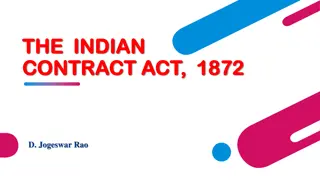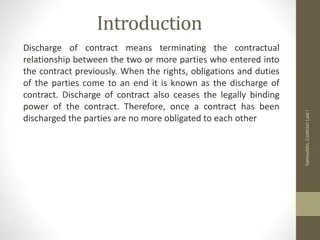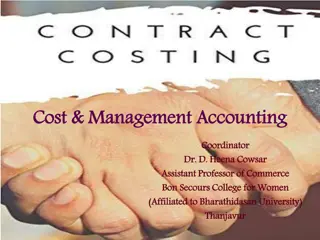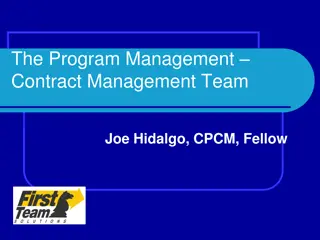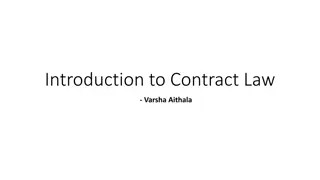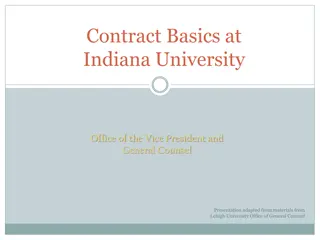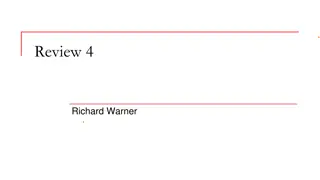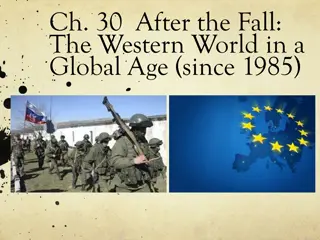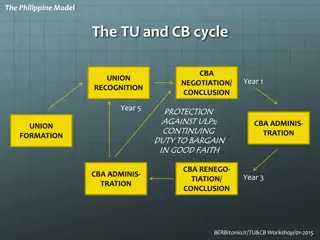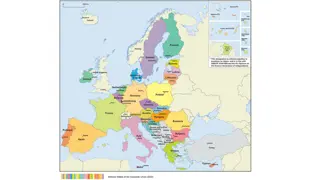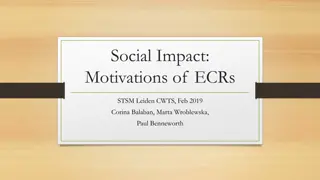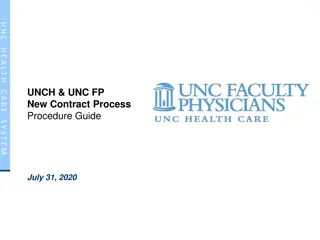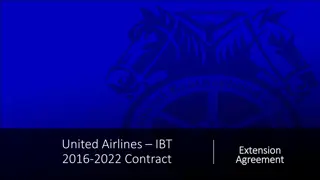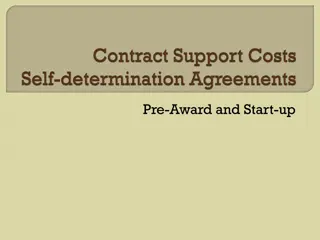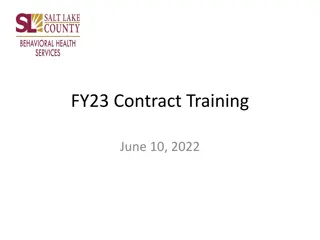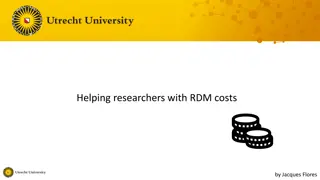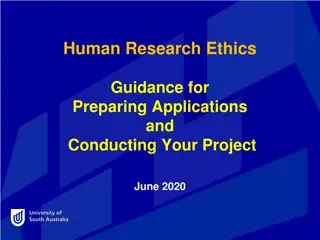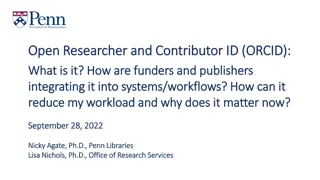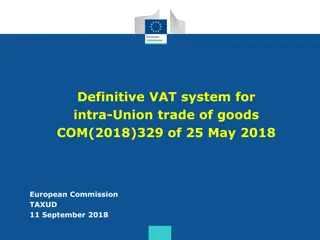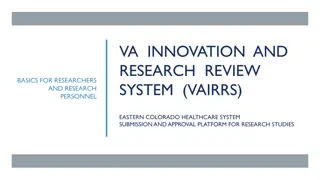Academic Researchers' Union Contract Details at UC System
The Academic Researchers' Union at the University of California system, represented by UAW Local 5810, successfully negotiated a new contract in a record time in 2019. The contract covers specialists, project scientists, and professional researchers, with salary adjustments and unit exclusions clearly outlined. Approximately 4750 Academic Researchers are part of this bargaining unit, and the current contract expires in September 2022.
Download Presentation

Please find below an Image/Link to download the presentation.
The content on the website is provided AS IS for your information and personal use only. It may not be sold, licensed, or shared on other websites without obtaining consent from the author. Download presentation by click this link. If you encounter any issues during the download, it is possible that the publisher has removed the file from their server.
E N D
Presentation Transcript
Academic Researcher Unit Academic Researcher Unit New Contract Training New Contract Training
Background of Bargaining Unit Background of Bargaining Unit The UAW already represents two academic bargaining units at University of California Graduate Student Employees (Local 2865) Postdoctoral Scholars (Local 5810) In fall, 2018, UAW successfully organized the Academic Researchers UC and UAW reached agreement on the parameters of the bargaining unit in February, 2019. We started bargaining in April, 2019 New Contract ratified November 8, 2019 perhaps a record for speed in bargaining a brand new contract. Academic Researchers are part of the same local as Postdocs: Local 5810
Contract Duration Contract Duration Contract was ratified on November 8, 2019 2503 members voted, with 98% in favor of ratification Contract expires September 30, 2022 -- a three-year deal Bargaining begins again in May, 2022
Who is in the Unit? Who is in the Unit? Specialists, including Junior Specialists Title Codes: 3300, 3301, 3310, 3311, 3320, 3321, 3329, 3330 Project Scientists Title Codes: 3390, 3391, 3392, 3393, 3394, 3395, 3490, 3491, 3492, 3493, 3494, 3495 Professional Researcher Title Codes: 1987, 1988, 1989, 1997, 1998, 1999, 3170, 3180, 3190, 3200, 3210, 3220 How many Academic Researchers are there? Approximately 750 at UC Davis, and 4000 systemwide
Who is Who is not notin the unit? in the unit? Supervisors (must meet HEERA definition of supervisor to be excluded from unit) Without Salary appointments Visiting appointments (must actually be visiting from another institution)
SALARY SALARY Range Adjustment to Base Salary January 1, 2020 4% Range Adjustment Specialists and Project Scientists 4.5% Range Adjustment Professional Researchers July 1, 2020 3% Range Adjustment July 1, 2021 3% Range Adjustment July 1, 2022 3% Range Adjustment NOTE: Unlike all other academic appointees, the represented Academic Researchers did not receive a range adjustment in 2019.
SALARY SALARY Equity and Smoothing For some of the ranks and steps in the Specialist and Project Scientist series, there will be additional increases over the life of the contract to address: Compression with Postdoc Salary Scale Compression with Staff Research Associate Scale Unequal increments between steps Equity and Smoothing does not impact the B/E/E scales
SALARY SALARY Off-Scale Components and Merit Increases Off-Scale Components Contract permits off-scale components to salary Increases to the off-scale components are at the location s discretion No notice to the union required Merit Increases In addition to range adjustments, salaries are subject to merit increases under the Step Plus system. (More on this later.)
SALARY SALARY Off-Scale Rounding Timeline for rounding of off-scale components for the Academic Researchers Effective October 1, 2019, all new off-scales shall be rounded to the nearest $100 when the scale salaries of the relevant title series are multiples of $100. Effective January 1, 2020, all Step Plus half-steps shall be rounded to the nearest $100 when the scale salaries of the relevant title series are multiples of $100. Academic Affairs has verified that we are in compliance with this salary component and will maintain compliance with all future range adjustments to the Step Plus scales. Effective January 1, 2020, all Above Scale salaries will be range adjusted to the nearest $100 if the employee is included in the 1/1/2020 range adjustment. This adjustment will be automatic in UCPath as part of the range adjustment process. Effective January 1, 2020, the off-scale salary components of all employees who receive the 1/1/2020 range adjustment will be rounded to the nearest $100. Academic Affairs will round all the off-scale salary components as needed and submit them as part of the range adjustment process. All Step Plus Supplements will pay out at their current rate through their effective end date. For General Salary Administration, APM 600-18 b: Annual salary rates are rounded to the nearest $100 if the scale rates for the title series are given in $100 increments. For Off-scale Salaries, APM 620-4: An off-scale salary shall be in a multiple of $100 when the scale salaries of the relevant title series are multiples of $100.
Planning for pay increases Planning for pay increases Over the next three years, Academic Researcher salaries will go up substantially. Between now and July 1, 2020, all salaries will go up a minimum of 7% for Specialists and Project Scientists, and 7.5% for Professional Researchers. Additionally, depending on rank and step, equity and smoothing will result in even greater increases for some Project Scientists and Specialists. In addition, there is the possibility under Step Plus of as much as a two-step merit increase, which could result in as much as an additional 18% increase effective on July 1 of any of the next three years in some scenarios. These large initial increases will settle out over the life of this contract. PIs should carefully budget a range for new hires and budget appropriately for existing personnel.
Planning for pay increases (continued) Planning for pay increases (continued) Two Step Merit Cost Effective 7/1/2020 Effective 7/1/2021 Effective 7/1/2022 Assistant Specialist 8.4% 10.5% 11.3% Associate Specialist 11.9-12.5% 10.8-11.0% 10.5-11.0% Full Specialist 14.0-25.5% 14.8-25.5% 14.7-25.5% Assistant Project Scientist 9.3-11.6% 9.7-11.0% 9.6-10.8% Associate Project Scientist 11.0-12.5% 9.9-12.6% 9.6-12.6% Full Project Scientist 15.8-18.0% 15.8-18.0% 15.8-18.0% Professional Researcher scales are not subject to equity/smoothing so are not available. See current scales and plan accordingly for range adjustments and possible two-step merits.
NOTIFICATION OF APPOINTMENT AND NOTIFICATION OF APPOINTMENT AND REAPPOINTMENT REAPPOINTMENT For appointment, follow APM UCD 220-AF and APM UCD 220 Procedure 1 Upon approval of the appointment, the Dean s Office or Academic Affairs sends the standard congratulatory appointment letter. Within seven (7) calendar days of appointment, the department is required to give the new employee a notice of appointment based on the template available via the deans office in the Academic Affairs Box folder. This notice of appointment contains critical information required by the contract. For reappointment, the same notice of appointment is required.
APPOINTMENT LENGTH APPOINTMENT LENGTH Minimum 1 year appointments until first merit review Exceptions: lack of work, lack of appropriate funding, programmatic need Locations are not prohibited from providing longer term appointments With first merit review, any reappointments are for normative period of review for rank and step No exceptions If needed, see layoff provisions Step with indefinite duration (no normative time) must be reviewed at least every five years with minimum of 3 year appointment, and, if reappointed, followed by 2 year appointment.
APPOINTMENT LENGTH EXAMPLE #1 APPOINTMENT LENGTH EXAMPLE #1 Associate Specialist with initial appointment at Step I on July 1, 2018 Reappointed at Step I on July 1, 2019 through June 30, 2020 Normative Review Cycle is 2 years Merit review to be effective July 1, 2020 is conducted, 1-STEP MERIT GRANTED Q: If reappointed on July 1, 2020, what is the minimum required length of appointment? A: Reappointment July 1, 2020 must be for minimum of two years (normative review cycle)
APPOINTMENT LENGTH EXAMPLE #2 APPOINTMENT LENGTH EXAMPLE #2 Full Project Scientist with initial appointment at step I on March 1, 2019, ending June 30, 2020 Normative review cycle is 3 years Reappointed at step I on July 1, 2020 through June 30, 2021 Reappointed at step I on July 1, 2021 through June 30, 2022 Merit review to be effective July 1, 2022 is conducted MERIT DENIED Q: If reappointed on July 1, 2022, what is the required minimum length of appointment? A: Reappointment on July 1, 2022 must be for minimum of three years (normative review cycle)
APPOINTMENT LENGTH EXAMPLE #3 APPOINTMENT LENGTH EXAMPLE #3 Academic Researcher at a step with indefinite duration Examples: full Specialist step IX, full Project Scientist step V and above, full Professional Researcher step V and above Must be reviewed for merit at least every 5 years Upon review, reappointed for a minimum of 3 years. If reappointed, to be followed by a minimum of 2 years
MERIT AND PROMOTION REVIEW PROCESS MERIT AND PROMOTION REVIEW PROCESS Key Features UC Davis will continue to use Step Plus for Academic Researchers. Under Step Plus, Academic Researchers are eligible for advancement after normative time at current step (2, 3, or 4 years) Under Step Plus, all candidates are considered for 1-step, 1.5-steps or 2-step advancement Promotion to the Associate or Full rank can occur prior to normative time, but thus can only be considered for 1-step promotion review or a lateral promotion if applicable (Project Scientists and Professional Researchers only) We can keep most of our existing protocols, guidelines and delegations of authority for conducting merit and promotion reviews. However, we now have strict timelines, and we must become much more consistent in following our practices. Reviews must be concluded by the effective date of July 1.
MERIT AND PROMOTION REVIEW PROCESS MERIT AND PROMOTION REVIEW PROCESS Beginning the process ALL UNITS: Run an eligibility report in APHID of academic researchers who are eligible to be reviewed and independently confirm accuracy of report. Eligibility is dynamic and automatically recalculated in APHID with each final decision. DEPARTMENTS: Complete page 1 of the Notification of advancement eligibility for an Academic Federation member form for each eligible Academic Researcher, and get their PI to complete part 1 on page 2. DEPARTMENTS: Provide form (completed as noted above) and written notification of eligibility to academic researchers eligible for review at least 6 weeks before their materials are due to the department.
MERIT AND PROMOTION REVIEW PROCESS MERIT AND PROMOTION REVIEW PROCESS Notification of Advancement Eligibility for an Academic Federation Memberform This form is on the AA website, under Forms and Checklists , and on the Resources Academic Researchers page. Page 1 of this form is to be completed by the department staff (consult with Dean s office for assistance). Part 1 of page 2 of this form is completed by PI/Supervisor. Once page 1 and part 1 of page 2 are completed, this form is given to the candidate with the written notification of eligibility. Candidate completes part 2 of page 2, and submits form to the department chair.
MERIT AND PROMOTION REVIEW PROCESS MERIT AND PROMOTION REVIEW PROCESS Written notification of eligibility Written notification of eligibility to candidates must include: List of materials and how they should be submitted Due date to submit materials (at least six weeks out) Link to series article and applicable campus review guidelines Effective date of the merit or promotion (the following July 1) You must attach the Notification of advancement eligibility for an Academic Federation member form, partially completed as noted in previous slide A template will be available in a Box file of templates soon
MERIT AND PROMOTION REVIEW PROCESS MERIT AND PROMOTION REVIEW PROCESS TENTATIVE 2020-2021 Deadlines Deadline materials are finalized and due to the following location:1 VP Office (Non- Redelegated) Senate Office (Redelegated) Notice of Eligibility to Candidate2 Review Type Dean's Office3 Department Promotion to Associate rank in the following Federation title series: Adjunct Professor, Health Sciences Clinical Professor, Professional Researcher, Project Scientist, Specialist in Cooperative Extension, and Specialist All other Promotions in all Federation title series: Academic Administrator, Adjunct Professor, Health Sciences Clinical Professor, Professional Researcher, Project Scientist, Specialist in Cooperative Extension, and Specialist Merits to Associate rank, Steps 4 and 5 for Professional Researchers, Specialist in Cooperative Extension, and Academic Senate titles that are not redelegated (see the delegation of authority) All other redelegated Academic Senate and Federation actions, including all 2.0-step merits that started as redelegated. 1These deadlines reflect the latest possible dates for submission of materials. Departments and Dean s Offices may set earlier deadlines 2Per the Contract for the Academic Researchers Unit (RA) between the University of California and the United Automobile, Aerospace, and Agricultural Implement Workers of America (UAW), academic researchers shall receive written notification of eligibility at least six (6) weeks before materials are due. 3Departments are required to allow the candidate 10 calendar days prior to submitting the action to the dean s office to review the final department letter and submit a rejoinder. 09/24/2020 11/6/2020 11/30/2020 12/18/2020 09/28/2020 11/10/2020 12/8/2020 1/8/2021 09/28/2020 11/10/2020 12/8/2020 1/15/2021 11/23/2020 1/5/2021 1/29/2021 2/26/2021
MERIT AND PROMOTION REVIEW PROCESS MERIT AND PROMOTION REVIEW PROCESS Once Candidate Submits Materials to Department: Department or Unit follows approved Peer and Voting Group plan for peer review and voting on advancement. The outcome of the vote informs the Department recommendation. After review by the Dean s office, and according to the Delegation of Authority, advancement dossiers are reviewed by the Joint Academic Federation/Academic Senate Personnel Committee (JPC), which makes a recommendation. Advancement decisions made by the Dean for most merits, or by the Vice Provost for Promotions and Merit advancements with recommendations for 2-steps.
MERIT AND PROMOTION REVIEW PROCESS MERIT AND PROMOTION REVIEW PROCESS Deferrals Academic Researcher uses Part 2 of the Notification of Advancement Eligibility for an Academic Federation member form to request a deferral. Granting a deferral request is at the discretion of the University If the request for deferral is granted, the written acknowledgement should address the length of the next appointment
APPOINTMENT LENGTH AND APPOINTMENT LENGTH AND MERIT/PROMOTION REVIEW MERIT/PROMOTION REVIEW BEST PRACTICE (but not required by contract) Try to sync up an Academic Researcher s merit/promotion review cycle with their appointment term Example 1: If you hire a new Project Scientist on March 1, consider making their appointment end on June 30 of the following year.
APPOINTMENT LENGTH AND APPOINTMENT LENGTH AND MERIT/PROMOTION REVIEW (Continued) MERIT/PROMOTION REVIEW (Continued) Example 2: Full Project Scientist (3-year review cycle) receives merit 7-1-2020, and receives reappointment for three years beginning 7-1-2020. Requests and is granted deferral 7-1-2023. Reappointed for three years effective 7-1-2023. Receives merit effective 7-1-2024. Consider issuing new notice of reappointment (superseding old notice) for a three year appointment effective 7-1-2024, to keep appointment term and merit review cycle aligned.
Junior Specialists Junior Specialists Junior Specialists are normally appointed for a term not to exceed one year, and may be reappointed for a maximum of one second full year. A third year is available only by exception granted by the Dean at request of PI. Junior Specialists do not undergo merit review. If the Junior Specialist was hired via an open recruitment and meets the appointment criteria for the assistant specialist rank, they may be eligible for a promotional review to Assistant Specialist. Junior Specialists have two steps. When reappointing for a second year, the Junior Specialist may be reappointed on the second step according to the school/college/department practice.
LAYOFF AND REDUCTION IN TIME LAYOFF AND REDUCTION IN TIME A Layoff or Reduction in Time may be based on: Lack of appropriate funding Lack of work Change in Programmatic need Layoff order is based on special skills, knowledge, or ability The layoff unit at UC Davis is the laboratory or Research unit The employee gets 45 day notice of layoff or reduction in time There will be a template notice available soon Academic Affairs must review and approve notices of layoff before they are issued Academic Affairs will provide notice to union within five days of notice to Academic Researcher
Process for Layoff and Reduction in Time Process for Layoff and Reduction in Time When need for Layoff or RIT becomes known: Deans office downloads and provides to the department the current layoff/reduction in time worksheet and template letter from Academic Affairs Box Folder. Department works with PI to complete the worksheet Department drafts letter using template, and submits the worksheet and draft letter to Deans office for review. Deans office reviews and revises as necessary, and submits to assigned team in Academic Affairs with copy to Associate Director James DiCaprio (jjdicaprio@ucdavis.edu) for review and approval. Once approved by Academic Affairs, signed letter may be issued by the department. Final letter must be provided again to both assigned team in Academic Affairs for the personnel file and Associate Director James DiCaprio for routing to the union.
LAYOFF AND REDUCTION IN TIME LAYOFF AND REDUCTION IN TIME Layoff Status An Academic Researcher who has been laid off or had their time reduced shall have layoff status for one year, or until the end of their appointment, whichever is sooner. An Academic Researcher on layoff status shall be offered a vacant position that the University intends to fill for the same title and in the same layoff unit, if the Academic Researcher is qualified. The Department and Dean s Office are responsible for ensuring laid-off Academic Researchers receive consideration of their qualifications for vacant positions in the same layoff unit.
LAYOFF AND REDUCTION IN TIME LAYOFF AND REDUCTION IN TIME Special Provision for PIs and co-PIs PIs and co-PIs may request to reduce their salaries as an alternative to layoff or reduction in time Granting request is at the discretion of campus Reduction may not exceed their term appointment Agreement must be in writing a template agreement is available from Academic Affairs via the Deans office PI must remain FLSA exempt PI s effort must remain commensurate with their appointment percentage
Percentage Appointment and Effort Percentage Appointment and Effort Most Academic Researchers are exempt Some part-time Researchers are non-exempt (hourly). Workload must be commensurate with appointment percentage. BEST PRACTICE: Set work schedule to align with appointment percentage. Example: 80% = Monday through Thursday. BEST PRACTICE: Avoid odd appointment percentages, e.g., 60%, not 63.2% BEST PRACTICE: Avoid 49% appointments (just shy of eligible for benefits) BEST PRACTICE: For any part-time appointee, PI should document how they assign workload in such a way that workload does not exceed appointment percentage.
Non Non- -Reappointment Reappointment Written notice of non-reappointment is NOT required for: Appointments that are less than 50% time or short-term appointments of less than a year. Appointments of more than 50% time with fewer than eight (8) consecutive years of service.
Non Non- -Reappointment (continued) Reappointment (continued) Written notice of non-reappointment IS required for: Appointments of more than 50% time with eight (8) or more consecutive years of service. 1. Requires Notice of Intent at least sixty (60) days prior to the end date and shall state the following: The intended action is not to reappoint the Academic Researcher and the proposed effective date; The basis for non-reappointment, including a copy of any materials supporting the decision not to reappoint; The Academic Researcher s right to respond either orally or in writing within fourteen (14) calendar days of the date of issuance of the written Notice of Intent; and The name of the person to whom the Academic Researcher should respond 2. The Academic Researcher shall be entitled to respond, either orally or in writing, within fourteen (14) calendar days of the date of issuance of the written Notice of Intent. The response, if any, shall be reviewed by the administration. 3. After timely review of the response, if any, the University shall issue a written Notice of Action, within thirty (30) calendar days of the date of issuance of the written Notice of Intent, to the Project Scientist and the Union of the non-reappointment and its effective date.
NEW RULES ABOUT NEW RULES ABOUT WITHOUT SALARY (WOS) APPOINTMENTS WITHOUT SALARY (WOS) APPOINTMENTS GENERAL RULE FOR NON-PIs: Do not give WOS appointments to Academic Researchers who have been laid off or have not been reappointed due to lapse of funding, even if future funding is expected. EXCEPTION FOR PIs WITH LAPSE IN FUNDING FOR LESS THAN FOUR MONTHS: For Academic Researchers who are Principal Investigators, if funding lapses but is expected to be restored within four months, you may place their represented title on a short work break in UC Path and give them a WOS appointment. EXCEPTION FOR PIs WITH LAPSE IN FUNDING FOR MORE THAN FOUR MONTHS: For Academic Researchers who are Principal Investigators, if funding lapses with an expectation that it will be restored after more than four months, issue notice of layoff for represented title, place them on a WOS appointment, and end the represented title appointment. Do not create a short work break .
WORK AUTHORIZATION PAPERWORK WORK AUTHORIZATION PAPERWORK ON REAPPOINTMENT ON REAPPOINTMENT SPECIAL RULE Only upon reappointment, the University may be liable for failing to process work authorization (visa) paperwork promptly The Academic Researcher must show: The University s failure resulted in delay in effective date of reappointment, and The Academic Researcher made reasonable efforts to follow up with University to ensure timely processing Any remedy due to the Academic Researcher would be calculated in reference only to pay lost during the time the University was solely responsible for the delay.
BENEFITS BENEFITS Academic Researchers will keep their current benefits, with same eligibility requirements Health plans Choice of Retirement plans for new hires (Savings Choice or traditional pension) If Regents increase employee contributions to pension, University must bargain the increase with UAW. Sick Leave No change from APM Vacation Leave No change from APM
LEAVES LEAVES Standard leave provisions in accordance with UC policy and legal requirements Use of unlimited accrued sick leave for baby bonding Requests for intermittent parental leave of less than 2 weeks shall not be unreasonably denied.
UNION SECURITY UNION SECURITY Key Article for the Union University will refer Academic Researchers union-related inquiries to the union Provides for automatic payroll deduction of union dues and Voluntary Political Action contributions Provides for process of providing monthly electronic data to the union about their bargaining unit members
UNION ACCESS TO NEW EMPLOYEES UNION ACCESS TO NEW EMPLOYEES University must provide the union 30-minute access to new Academic Researchers for the purpose of new employee orientation by the union using one of the following methods: Location-wide group onboarding (does not exist at UC Davis) If no location-wide group onboarding, then union access to location-wide new employee orientation Catch-all: If neither of the above, then individual union orientation, one-on-one. Union is responsible for contacting the researcher and scheduling the orientation. Local LR office will provide union with schedule for group onboarding or new employee orientation at least 10 calendar days in advance. Attendance is mandatory.
Out of Unit Movement Out of Unit Movement If a represented Academic Researcher is deemed a supervisor (under HEERA definition) or has a title change out of the bargaining unit, the University must provide 30-day advance notice to the union. The Academic Researcher shall be removed from the unit on the effective date. If union disagrees, they can file a grievance, and take it to arbitration. The arbitrator is limited to determining whether the Academic Researcher should be in or out of the bargaining unit. NOTE: There is no duty to notice the union if an Academic Researcher applies for a non-bargaining unit position through an open recruitment and is selected.
ACADEMIC FREEDOM (DOES NOT APPLY) ACADEMIC FREEDOM (DOES NOT APPLY) The new APM 011, Academic Freedom, Protection of Professional Standards, and Responsibilities of Non-Faculty Academic Appointees does NOT apply to Academic Researchers Unexpected surprise at bargaining table: The Union was not interested in giving the University academic responsibility in exchange for receiving academic freedom.
Other Key Contractual Provisions Other Key Contractual Provisions Health and Safety Grievance and Arbitration Non-Discrimination No Strikes Management and Academic Rights Corrective Action and Dismissal Reasonable Accommodation Medical Separation Personnel Files
Where is the Contract? The Entire Contract will be available on line by the end of the year. Find additional resources and links on Academic Affairs website, under Resources.
